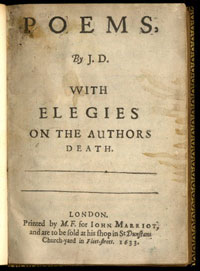DONNE'S VIEW OF POETRY

DONNE'S VIEW OF POETRY

These ideas are from: John Donne's Apology for Poetry by Lynette McGrath.
In some respects Donne was influenced by the ideas of Sidney's Defense of Poetry as studied in the Renaissance:
1. If I could draw my pains through Rimes' vexation...for he tames it that fetters it in verse.
2. Donne and Sidney both believed in the pragmatic theory, and that form should not dominate content.
3. The right use of true poetry can be found in the scriptures, which cannot be perverted since it alone is divinely inspired.
4. Although Donne did no go so far as to believe that poetry could provide an "...ideal image whereby it becomes a means of ascending to God," he did note: "First then from the meanest artificer through the wisest philosopher. to God himself, all that is well done...according to preconceptions [fore-conceits], designs and patterns, proposed to ourselves before hand...God never did anything in any part of time, of which he had not an eternal preconception...of all things God had a pattern in himself before he made it." The poet therefore imitates an idea which had its origin in God.
5. The poet, however, could lie if he fails to use his imagination to persuade men to accept God.
6. Language is a means of mediating between God and man because language is a gift from God, and it turns back to God in prayer.
7. The idea the poet conceives is the heart of the poem, and it is shaped by the poet's knowledge of nature which is a reflection of the divine idea. This mirrors the 'real-word' existing as a result of God's creative act patterning His own divine idea.
8. Poetry must instruct men about what they should know.
9. Poetry accomplishes this by fictional and attractive lures. A poem provides an example dealing with one human situation which implies a reference to another human situation. Each poem is an argument or an example of what ought to be. The poem is a microcosm of a part of reality and therefore discloses the true order and motion of the finite world.
10. Poetry is a counterfeit creation, and makes things that are not, as though they were.
11. Poetry for Donne imitates making notable images of virtues, vices...it is a "...picture or representation [with which man will] satisfy and refresh himself...when he cannot comprehend the original and prototype.
12. Sidney's "fictional example" is Donne's parable of Christ; he calls them "powerful insinuations."
13. Poetry is Donne stimulates the reader's rational process which activates memory, imagination, will and understanding. Rational faculties are persuaded by the poet's argument, and appeals to the understanding through exhortation, symbol and example. The movement of the will is necessary for persuasion, and poetry energizes the will so, "...a man's reach may nearly equal his grasp."
COUNTER-ARGUMENT:
The Eighteenth Century critic and philosopher, Dr. Samuel Johnson, said this of Donne and his "metaphysical" school of poets: "They were men of learning, and to show their learning was their whole endeavor...They cannot be said to have imitated anything either in nature or in life. Their wit was of a grotesque order...The most heterogeneous ideas are yoked together by violence."
EXERCISE:
Relate the above to Donne's poetry, noting the use of metaphysical conceit. The contemporary poet and critic T.S. Eliot had a counter-counter argument.